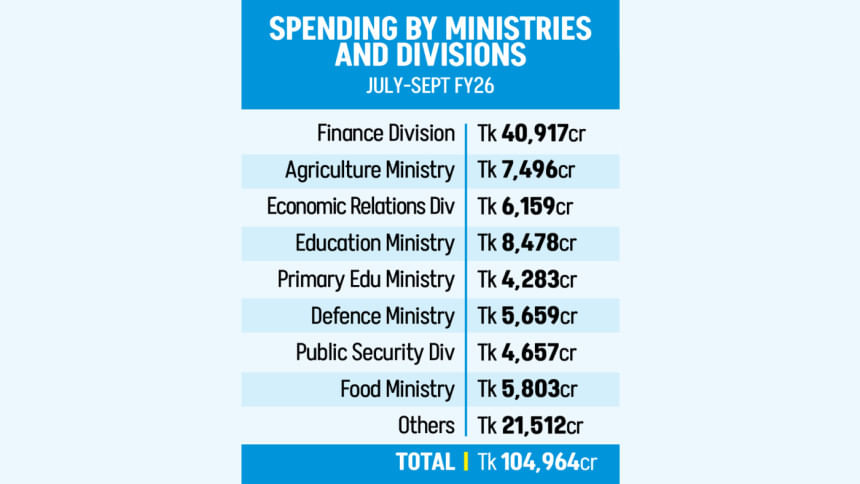Revised budget: Non-development spending to rise again

Non-development expenditure is set to rise again in the revised budget for the current fiscal year mainly due to higher costs on interest payments and subsidies.Capital support for a new state-owned bank and possible implementation of the Pay Commission's recommendations are also likely to add pressure.The Finance Division, Economic Relations Division, and agriculture ministry together spent Tk 54,571 crore, about 55 percent of total expenditure, during the first quarter of FY2025-26, mainly on...
Non-development expenditure is set to rise again in the revised budget for the current fiscal year mainly due to higher costs on interest payments and subsidies.
Capital support for a new state-owned bank and possible implementation of the Pay Commission's recommendations are also likely to add pressure.
The Finance Division, Economic Relations Division, and agriculture ministry together spent Tk 54,571 crore, about 55 percent of total expenditure, during the first quarter of FY2025-26, mainly on interest and subsidies.
Of this, Tk 31,952 crore, or nearly one-third of the total, went to interest payments alone.
Against this backdrop, Finance Adviser Salehuddin Ahmed is scheduled to hold a meeting on November 10 to review the economy and prepare the revised budget.
With national elections planned for mid-February, the government aims to finalise the budget revision by January, finance ministry officials said.
Last month, the Finance Division asked all ministries and divisions to submit their revised allocation proposals by November 9.
RISING COMMITMENTS
Following the June budget announcement, the government increased several allowances amid growing demands.
Most recently, it raised house rent allowances for MPO-listed teachers, adding around Tk 4,000 crore to non-development spending.
An additional cost is likely if the government moves to implement the pay commission's recommendations.
The commission is expected to submit its report by December, and the finance adviser had told The Daily Star earlier that partial implementation of the recommendations during this government's tenure had been under active consideration.
The upcoming national election will also add to expenditure, with around Tk 3,000 crore allocated for the Election Commission. The amount may rise if additional funds are sought.
Meanwhile, the government plans to inject Tk 20,000 crore in capital into a new bank to be formed by merging five troubled Islamic banks.
Of this, Tk 10,000 crore is expected to be transferred this month once the new entity's account is opened as the Bangladesh Bank is giving priority to protecting depositors' funds and restoring public confidence in the restructured system.
The central bank is expected to issue a licence for the new bank later this month after receiving the government's formal application, now awaiting law ministry clearance.
Economist Selim Raihan, executive director of South Asian Network on Economic Modeling (SANEM), said the capital support for the new bank could be a positive move if accompanied by lasting reforms.
"What needs to be examined is whether the reform initiatives undertaken in the banking sector will be continued under the next government," he told The Daily Star.
"Budgetary support for bank capital has been provided in the past as well. If these reforms are not sustained, it could lead to a waste of public funds, as seen in the past," said Raihan, also a professor at the University of Dhaka.
He further said just as political commitment is vital in political matters, it is equally important for economic reforms. "We have seen ample discussions on political issues. Unfortunately, we have not seen such discussions on economic issues with the political parties," he said.
FIRST QUARTER SNAPSHOT
In the last fiscal year, non-development expenditure in the revised budget rose as the government had to pay arrears in the power, energy, and fertiliser sectors, trimming development allocations.
In the first three months of this fiscal year, total government expenditure rose 10.29 percent year-on-year, reaching Tk 1,04,964 crore.
The Finance Division spent the most -- Tk 40,917 crore -- mainly on interest payments on domestic loans, power and energy subsidies, and sectoral incentives.
The Economic Relations Division followed, with Tk 6,159 crore spent on repayment of principal and interest on foreign loans.
The agriculture ministry spent Tk 7,495 crore, mostly on fertiliser subsidies and incentives.
Three education-related ministries and divisions spent Tk 13,500 crore, largely under the non-development budget for MPO-listed institutions.
The defence ministry spent Tk 5,659 crore, the Public Security Division Tk 4,657 crore, and the food ministry Tk 5,803 crore.
Meanwhile, revenue collection rose 17 percent year-on-year to Tk 117,117 crore in the same period, up from 4.94 percent growth a year earlier.
TIGHTER CONTROL
In view of rising non-development demands, the Finance Division has introduced stricter expenditure controls in the revised budget guidelines.
For example, spending on land acquisition under the non-development budget will be halted, while under the development budget it will be allowed only after all procedures and Finance Division approval are complete.
Except for the education, health, and agriculture ministries, new allocations for residential and non-residential buildings will only be allowed where work orders have already been issued.
Restrictions have also been placed on vehicle purchases, foreign travel, and other discretionary expenses.
Selim Raihan said the upcoming revised budget should serve as a pathway for the next government, noting that most budget implementation typically occurs in the final quarter of the fiscal year.
"In this context, it is crucial to ensure that the revised budget provides a clear pathway for the next administration," he said, adding that expenditure must remain consistent with revenue to prevent fiscal pressure on the incoming government.